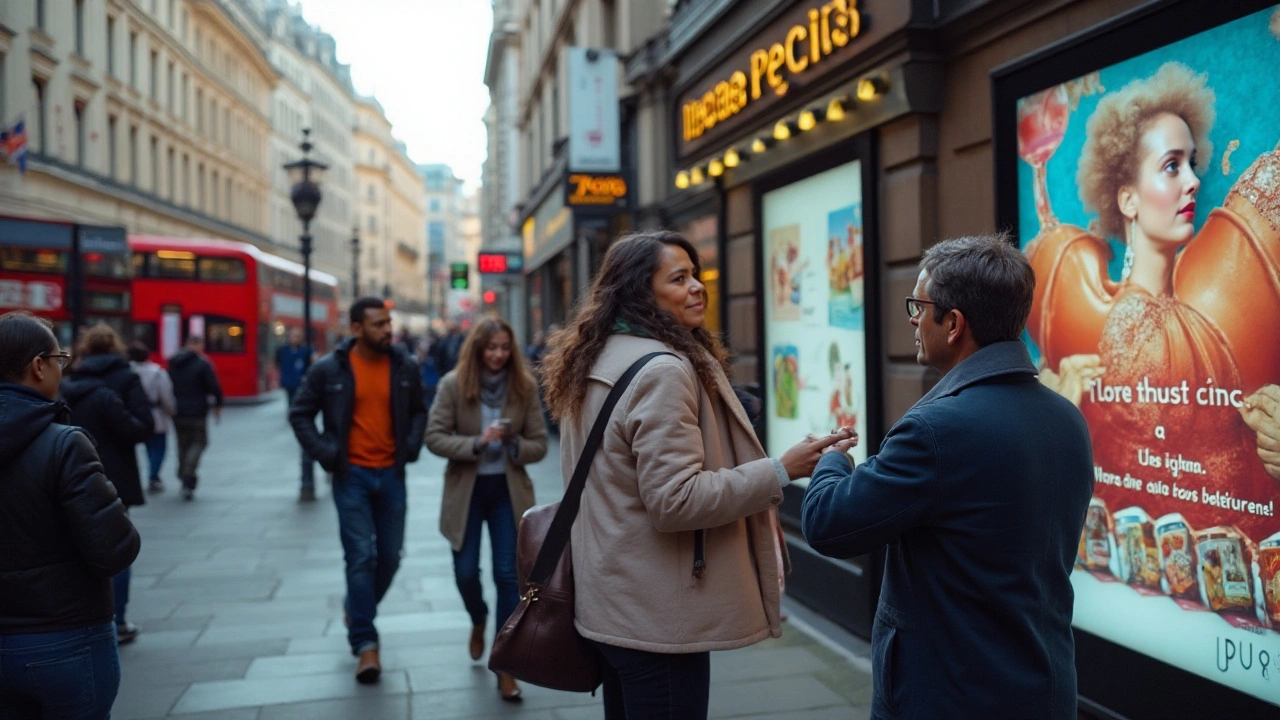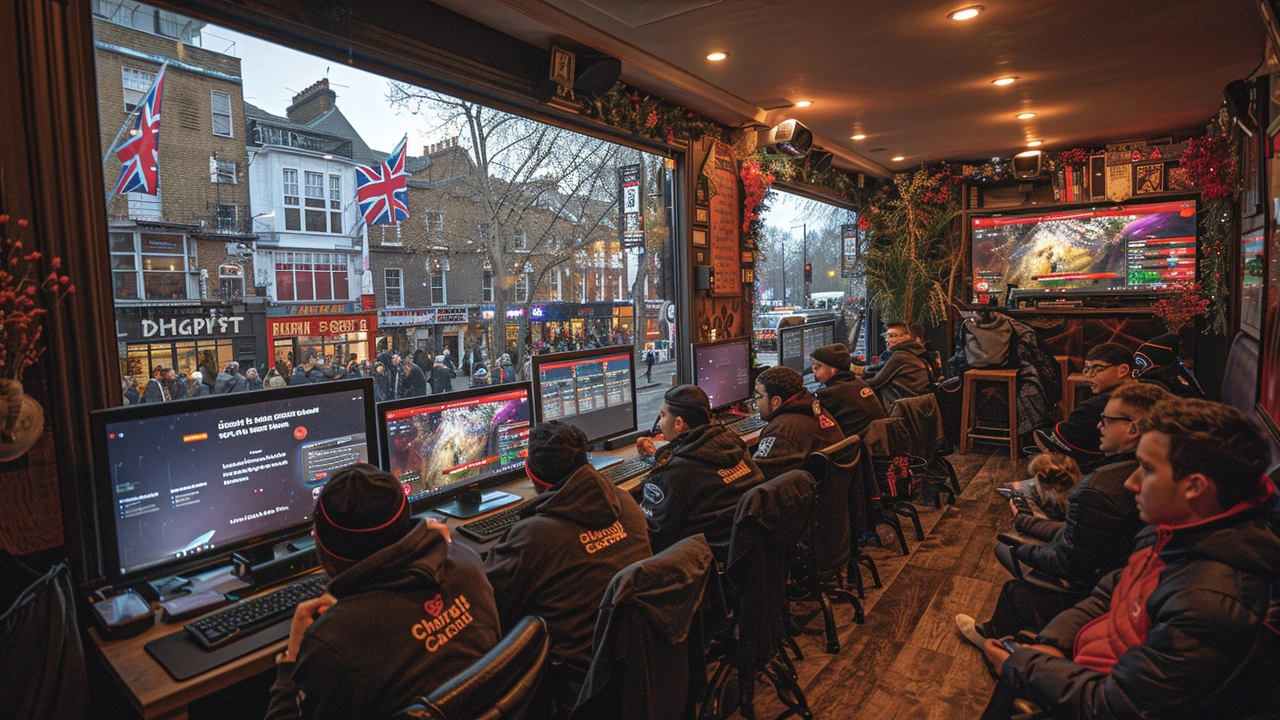Revolutionizing Digital Promotion with ChatGPT

In recent years, artificial intelligence has made significant strides, particularly in the marketing sector, where tools like ChatGPT are transforming how brands communicate with their audiences. AI's ability to process and generate language that mimics human interaction has opened up exciting new avenues for businesses to explore.
With the introduction of ChatGPT, a wave of innovation has swept through the world of digital marketing. It gives marketers the power to create compelling and personalized content that resonates with target audiences. This tool not only enhances customer interaction but also allows businesses to optimize their marketing campaigns with unprecedented precision.
As technology continues to advance, understanding how to effectively integrate ChatGPT into marketing strategies is becoming increasingly important. For businesses eager to stay ahead of the curve, embracing these advancements can lead to significant competitive edges and improved connections with customers.
- The Rise of AI in Marketing
- Crafting Personalized Content
- Improving Customer Engagement
- Optimizing Campaigns with AI
- Future Prospects of ChatGPT
- Practical Tips for Marketers
The Rise of AI in Marketing
The digital marketing landscape has experienced a revolutionary change with the advent of AI technology, reshaping how brands communicate and engage with their audiences. At the forefront of this evolution is ChatGPT, a powerful AI tool known for its remarkable language processing capabilities, offering significant improvements in customer interaction. From chatbots that manage customer service queries to algorithms that personalize content, AI infiltrates nearly every sector of marketing. This shift towards AI-driven solutions has introduced businesses to an array of innovative opportunities, empowering them to reach their audience in ways that were once deemed impossible.
For instance, platforms leveraging ChatGPT can instantly generate personalized responses tailored to each user, significantly enhancing customer experience. The ability of AI to learn and predict customer behavior opens doors for crafting highly targeted marketing strategies. According to a study by McKinsey, businesses utilizing AI in marketing can see a conversion rate boost of up to 20%. These statistics underscore the transformative potential of AI tools, highlighting their indispensable role in modern digital strategies. AI not only facilitates more efficient operations but also contributes to crafting more meaningful brand-consumer relationships, ensuring content remains relevant and engaging.
"AI is the tool that will bridge the gap between customer expectations and effective marketing delivery," says marketing expert Neil Patel.
With ChatGPT stepping into the limelight, marketers are challenged to harness its capabilities effectively. One of its most compelling features is its ability to craft content on demand. This is a game-changer for companies keen to engage users with fresh, relevant content without the traditional time constraints. Moreover, it allows brands to maintain consistency in tone and messaging across multiple platforms, further solidifying customer trust. As AI continues to evolve, it becomes evident that we're only scratching the surface of its potential.
Looking ahead, the future of AI in marketing promises to deepen the connection between brands and consumers. Innovations such as predictive analytics will enable companies to anticipate market trends and consumer needs with greater accuracy than ever before. The integration of AI into digital marketing strategies represents not just a trend but a fundamental shift that is shaping the blueprint of effective marketing. It's an exciting era where those who adapt and evolve with AI stand to reap the benefits, driving unprecedented growth and innovation within their organizations.
Crafting Personalized Content
Creating personalized content has never been more crucial in the realm of online marketing. With audiences being inundated with information, standing out necessitates a deeper connection with individuals. Here, ChatGPT excels by providing marketers with the ability to generate uniquely tailored messages that resonate on a personal level. The AI's natural language processing capabilities allow it to understand and simulate human interaction, making communications feel authentic and relatable. As consumers increasingly demand personalization, using ChatGPT to craft messages that speak to specific needs and preferences can effectively boost engagement and loyalty.
The ability of ChatGPT to analyze vast datasets also comes into play. It can sift through consumer behavior insights, social media interactions, and past purchase data to generate content that echoes the voice and sentiment of individual users. This level of customization goes beyond merely inserting a user's name into a message. Instead, it involves curating content that reflects their unique interests and past engagements with the brand. Organizations utilizing these AI tools have observed a marked increase in user interactivity, often translating into higher conversion rates.
Harnessing AI for Personalized Strategies
Another fascinating aspect of ChatGPT is its potential to automate and streamline content production processes without losing the personal touch that consumers cherish. By automating routine communications, marketing teams can redirect their focus towards creative strategy and innovation, while the AI performs exhaustive personalizations. This dual approach ensures that time is not wasted on repetitive tasks while still maintaining a level of intimacy with the audience. According to a recent study by McKinsey, brands that excel at personalization generate 40% more revenue from those activities than do average players.
"Personalization is not a trend; it’s a marketing tsunami that reshapes consumer expectations." - Lara Albert, Forbes
Deploying ChatGPT for personalized content creation empowers marketing professionals to address varied consumer segments efficiently. The AI can produce tailored emails, social media posts, and chat interactions that align with the brand’s tone and mission, thereby ensuring brand coherence across all channels. This is invaluable in constructing a narrative that reinforces the brand's relationship with each customer, as personalized experiences often lead to enhanced brand affinity.
Moreover, companies are finding innovative methods to harness this technology. Take the case of virtual retail assistants that use ChatGPT to deliver real-time personalized product suggestions. By analyzing a customer’s past purchases and browsing history, the AI can suggest items they are likely to love, thereby enhancing the shopping experience and increasing the chances for sales. This explicit example illustrates how AI can foster more meaningful interactions that lead to sales growth and customer retention.

Improving Customer Engagement
It's no secret that customer engagement is the cornerstone of successful online marketing strategies. Businesses are constantly seeking ways to enhance their interactions with customers to foster loyalty and satisfaction. With tools like ChatGPT at their disposal, companies are reimagining the way they connect with their audiences. By generating personalized and relevant conversations, ChatGPT aids marketers in maintaining a more consistent and interactive communication flow with potential and existing clients. This AI technology can simulate real conversation patterns, making interactions feel organic and less artificial. It's like having a digital assistant that's always ready to engage with the right words at the right time, significantly enhancing customer experience.
"Engagement is about fulfilling the customer's intent, not just broadcasting your message to them," says a leading marketing strategist.
An engaging customer experience means understanding and anticipating customer needs. By integrating ChatGPT into customer service channels, businesses can provide round-the-clock support, addressing inquiries without delay. This immediacy boosts customer trust, knowing that help is always available. Additionally, the data accumulated through these interactions can be used to further refine marketing strategies, tailoring content and offers to meet specific customer preferences.
Moreover, it’s crucial to acknowledge how ChatGPT redefines engagement through interactive content, such as quizzes, polls, and personalized recommendations. These interactive elements not only capture the user's attention but also provide valuable insights into customer behavior and preferences. Helping customers feel understood and valued goes a long way in increasing brand loyalty and advocacy. The ability to adapt and respond quickly to evolving customer demands illustrates the versatility of ChatGPT, significantly impacting retention rates and fostering a community around your brand.
The practical application of AI in digital strategy marks a significant leap forward in marketing. Through chatbots powered by AI, businesses are finding new methods to keep conversations alive with less human intervention, reducing operational costs and processing times. This allows team members to focus on more critical tasks, while AI manages straightforward customer queries and issues. As we move into an increasingly digital age, understanding and utilizing technology like ChatGPT to its fullest potential can set businesses apart. It's no longer enough to simply reach your target audience; engaging them meaningfully is where true success lies.
Optimizing Campaigns with AI
The landscape of digital marketing has been irrevocably altered with the introduction of AI technologies like ChatGPT. Now, businesses are increasingly utilizing this AI to enhance the effectiveness and efficiency of their marketing campaigns. By leveraging machine learning and natural language processing, marketers can analyze vast amounts of data to tailor campaigns that resonate deeply with audiences. AI enhances targeting precision, enabling marketers to customize messages based on consumer behavior patterns, which were previously difficult to discern using traditional methods.
One of the standout capabilities of ChatGPT is its ability to conduct predictive analysis. By analyzing past customer interactions and transactions, AI can anticipate future behavior. This predictive insight allows marketers to allocate resources more strategically, ensuring their campaigns target the right people at optimal times. The capability of ChatGPT to generate content also plays an integral role in optimization, as it ensures communications are both timely and relevant. AI-generated content can maintain a consistent brand voice while quickly adapting to user responses and feedback, making campaigns more responsive and engaging.
Dynamic Ad Adjustments
Dynamic ad adjustments have become increasingly popular, with AI leading the charge in this domain. In real-time, ChatGPT can analyze ad performance metrics, automatically adjusting elements such as visual content, headlines, and calls to action based on engagement data. This flexibility ensures ads are always performing at their best, without constant manual intervention. This process is not only efficient but also cost-effective, as it reduces the expenditure on underperforming ads by redirecting funds toward more promising avenues.
"AI-driven optimization has redefined what target reach means in the digital arena," states Susan Wojcicki, former CEO of YouTube. "The ability to understand and anticipate short-term trends enables brands to stay one step ahead of consumer needs, fostering a deeper connection between them and their audience."
Improving Conversion Rates
Beyond targeting, enhancing conversion rates is another critical aspect where AI proves beneficial. By understanding consumer interactions and responses, ChatGPT can refine call-to-action strategies, optimize landing pages, and even suggest product recommendations in real-time. Statistics show that businesses employing AI experience a significant increase in conversion rates. According to a study by Harvard Business Review, companies have seen conversion growth by up to 30% through AI-driven optimizations. This marks a considerable advancement, showcasing AI's ability to not just reach audiences but effectively convert them into customers.
In summary, online marketing strategies are given a technological lift with AI, offering unparalleled precision and adaptability. Marketers willing to integrate tools like ChatGPT into their workflows are poised to gain substantial advantages. The blend of AI's analytical muscle with creative variability holds tremendous potential to reshape campaigns, making them not just smarter, but more human in their appeal.

Future Prospects of ChatGPT
As we gaze into the future of digital communication, it's clear that ChatGPT is poised to play a monumental role in shaping online marketing strategies. The evolution of this AI tool is not just anticipated but eagerly awaited, with its potential being both vast and transformative. Its ability to continuously learn and adapt from interactions makes it a dynamic asset in any marketing arsenal. This adaptability means marketers can use ChatGPT to respond to changing trends and consumer behaviors almost instantaneously.
One of the most promising aspects of ChatGPT lies in its potential for hyper-personalization. By analyzing data patterns and user behaviors, it can tailor content to such a degree that each piece of communication feels uniquely crafted for individual consumers. This degree of personalization boosts engagement rates significantly, making promotions feel less like generic advertisements and more like personal invitations. According to a report by McKinsey, personalization can deliver five to eight times the return on investment (ROI) and can boost sales by 10% or more.
Another exciting prospect is the integration of ChatGPT with other emerging technologies. Imagine combining the capabilities of virtual reality (VR) or augmented reality (AR) with AI-driven communication. This could revolutionize the way brands build experiences around their products, making interactions more immersive and impactful. For instance, a travel company could use AI to guide potential tourists through an interactive tour of a destination, answering questions and crafting personalized itineraries in real-time.
"The future of marketing is one where AI and creativity coexist symbiotically, and tools like ChatGPT will be at the forefront of this revolution," said Marketing AI Institute in a recent publication.
The challenges that accompany such rapid advancement are also worth noting. Concerns around data privacy and ethical AI use require continuous dialogue and innovation. As ChatGPT models evolve, ensuring they operate within ethical bounds will be crucial. Regulations and consumer expectations might necessitate new strategies for data management and transparency. These challenges are not insurmountable but will demand attention as the tool's capabilities expand.
Looking ahead, educators and developers are collaborating to push the limits of what ChatGPT can achieve. By upgrading its natural language processing abilities and integrating culturally nuanced understanding, the tool will become even more relatable to diverse global audiences. It can potentially break language barriers, allowing brands to communicate seamlessly across different markets. This kind of global reach would be invaluable in today's interconnected world.
In conclusion, the horizon for ChatGPT in online marketing is bright, filled with both opportunities and responsibilities. Brands that effectively harness its power will likely find themselves leading the charge, creating marketing experiences that are not only effective but also enriching for consumers. As we stand on the cusp of what feels like a new era in marketing, embracing these technological advancements offers a path forward that's as promising as it is exciting.
Practical Tips for Marketers
Embracing ChatGPT in your marketing strategy can seem daunting, but with clear guidance, the process can be exhilarating and rewarding. First and foremost, understand the tool's potential. It's vital to familiarize yourself with its features and functionalities. Once you grasp how it can assist in personalized content creation and enhance customer interaction, you'll feel more confident using AI to amplify your outreach efforts. This knowledge paves the way for creative applications that align with your brand's message and voice. Remember, tools like ChatGPT are continually evolving, so staying updated with new functionalities can keep your strategy on the cutting edge. Engaging with webinars, workshops, and forums can provide fresh insights and spark innovative ideas that you can apply directly to your campaigns.
Another crucial aspect is integrating digital strategy with content goals. Define what you aim to achieve with AI-generated content. Is it to drive engagement, boost conversion rates, or enhance brand loyalty? Once the goals are set, use ChatGPT to experiment with different content types and tones. Encourage collaboration among your marketing team to brainstorm and test various outputs. Have them engage with ChatGPT to produce content drafts swiftly, which can then be polished to perfection. This practice not only expedites the content creation process but also infuses diversity and innovation into your marketing efforts.



